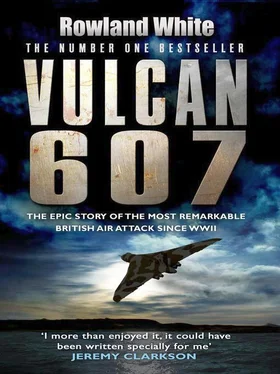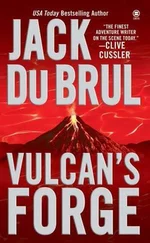Alone on Withers’ crew, AEO, Flight Lieutenant Hugh Prior had been to RED FLAG before. Chosen as the most qualified Vulcan AEO for that first RAF deployment in 1977, he knew well the dangers the Nellis ranges presented. That year a Blackburn Buccaneer S2, trying to negotiate its way through the jagged Nevada peaks at 100 feet and 500 knots, was lost. On one occasion, Prior had thought the same fate awaited his Vulcan. As his two pilots scanned the ridgelines looking for gaps through to the next valley, one told the other, ‘We’re not going to make it.’ To Prior and the two navigators seated facing to the rear, without a view out, it was a statement open to misinterpretation at the very least. The pilot was lucky any of the three backseaters climbed into a plane with him ever again.
The Vulcans were at the Nellis ranges to practise for one thing only: to deliver a nuclear bomb. And on Martin Withers’ crew ultimate responsibility for the success of that fell to the amiable young Navigator Radar, Flight Lieutenant Bob Wright. And even getting to a frontline squadron had been far from plain sailing for him. Wright had wanted to be a pilot, but had been told after three attempts that he didn’t have the aptitude for it. Hand–eye co-ordination, they’d said. Poor A-level results didn’t help either. But he still wanted to fly and so he accepted the knock-back and joined the RAF as a Navigator, eyeing the possibility of a posting to a fast-jet squadron. Then he flunked Navigator training. He got through the second time, but then had to endure watching other students get postings to the Buccaneers and Phantoms he wanted while he got Vulcans. But as soon as he arrived at Waddington things started looking up. Being on the squadron was exactly what he’d needed. He was learning and improving with every sortie. On a five-man crew, the others were able to support and nurture the new boy. Wright, the Navigator Radar, operated the Navigation and Bombing System (NBS). This included a powerful radar which he used to fix the aircraft’s position against distinctive ground features. Low over the ridges and valleys of the Nevada scrub, he also served another vital function – providing back-up to the pilots who used their own Terrain-Following Radar (TFR) to fly clear of obstacles. Sitting at his right shoulder, Navigator Plotter Gordon Graham planned the route, and navigated the aircraft around it. He controlled the jet’s primary navigation system: the Ground Position Indicator Mk 6. The GPI6 provided a continuous read-out of the aircraft’s position over the ground in latitude and longitude. Graham’s system was linked to Wright’s NBS, and information could be passed between the two. The two navigators worked together, and as RED FLAG progressed each began to develop an instinct for how the other operated. They were becoming a strong team. In the end though, while Graham could navigate the aircraft, the pilots Withers and Taylor could follow his directions, and AEO Hugh Prior could try to make sure they stayed safe from the attentions of enemy air defences, it was still Wright who had to drop the bomb on target. And that alone was the Vulcan’s raison d’être .
Galtieri’s accession to Argentina’s presidency meant that Anaya’s plot to invade Las Islas Malvinas became a priority. In so doing, it displaced an earlier initiative to test Britain’s resolve in the region. In July 1981, encouraged by signals from London suggesting a waning interest in the South Atlantic, Anaya and Vice-Admiral Juan Lombardo, the Commander-in-Chief of the Argentine fleet, had begun planning a different operation. In 1976 the two men had put fifty naval technicians and scientists ashore on the frozen British island of Southern Thule, one of the chain of South Sandwich Islands that lie 400 miles to the south-east of South Georgia. The Argentinians quietly constructed a permanent weather station there and, beyond protesting, the British did nothing to remove them.
Anaya and Lombardo proposed to repeat the operation on South Georgia itself. The plan was christened Operation ALPHA and was designed to establish an Argentine claim on the remote outpost. But with Galtieri in power, ALPHA was relegated, quickly overtaken in Anaya’s imagination by the greater prize: taking possession of Las Malvinas. Plans for ALPHA, however, remained in place. Lombardo quickly realized that Operation BLUE, as the Falklands plan became known, would be jeopardized if Operation ALPHA was allowed to go ahead. The British were certain, he thought, to send a nuclear hunter-killer submarine in response to any move on South Georgia and the Argentine Navy simply had no answer to a weapon of such stealth and sophistication.
Lombardo signalled Anaya in Buenos Aires from his base at Puerto Belgrano on 15 January in order to make his point and was told by Anaya that ALPHA had been cancelled. Reassured, Lombardo and his staff carried on with detailed planning for Operation BLUE. The Falkland Islands’ long and messy history was about to become manifest.
Early disputes over sovereignty were characterized by their half-heartedness – that is, until any rival displayed an interest. Sightings of the islands by ships rounding Cape Horn date back to the sixteenth century, but it was the British who were the first to record setting foot on the islands, when a privateer, Captain John Strong, en route to Chile, was forced to take refuge there from a storm. Few, however, seemed particularly enamoured of the bleak, treeless islands that sat like a pair of lungs, either side of Falkland Sound – the channel of water named by Strong after the then Lord of the Admiralty. It was over sixty years before a more permanent presence on the islands was established. And it was French. Antoine de Bougainville created the small settlement of Port Louis on East Falkland in 1764, claiming the islands for the French king. Three years later, in an attempt to strengthen an alliance with Spain, the colony was sold to her for the modern-day equivalent of £250,000 and Port Louis became Puerto Soledad. And Les Malouines – named after the French port of Saint-Malo – became Las Malvinas. And that would have been that: the islands would have passed from Spain to Argentina as that country came into existence in the early 1800s, assuming independence and control of Spain’s South American territories.
Or it would have been were it not for the fact that, while all this was going on, the British had arrived on Saunders Island off West Falkland in 1765, fenced off and planted a vegetable garden, and named the whole enterprise Port Egmont. But although the British mission might have been motivated by French interest in the region, the men on the ground appear to have been entirely ignorant of the rival French settlement at Port Louis.
When the British conducted a more thorough reconnaissance the following year, however, they stumbled on de Bougainville’s colony, now numbering around 250 people. Offered a choice by the British expedition’s leader, Captain John McBride, of leaving or swearing allegiance to George III, the colonists called his bluff and a humiliated McBride was forced to return to England, leaving behind only a small contingent of marines at Port Egmont.
Two years later, those thirteen marines gave themselves up to the Spanish commodore commanding the fleet of five frigates sent from Buenos Aires to expel them. The shame provoked a public outcry in Britain and a demand that national honour be avenged. Neither Britain nor Spain – without French support, at least – wanted war, however, so while Dr Johnson, commissioned by the British government, wrote a pamphlet trying to devalue the islands in the mind of the nation, a compromise with Spain was negotiated.
For three years, the British colony returned to Port Egmont before quitting for good in 1774, leaving behind only a plaque restating Britain’s sovereignty, which read: ‘Be it known to all nations that Falkland’s Ysland, with this fort, the storehouses, wharf, harbour, bays, and creeks thereunto belonging, are the sole right and property of His Most Sacred Majesty George III.’
Читать дальше










![Helen Rowland - The Widow [To Say Nothing of the Man]](/books/752764/helen-rowland-the-widow-to-say-nothing-of-the-man-thumb.webp)
